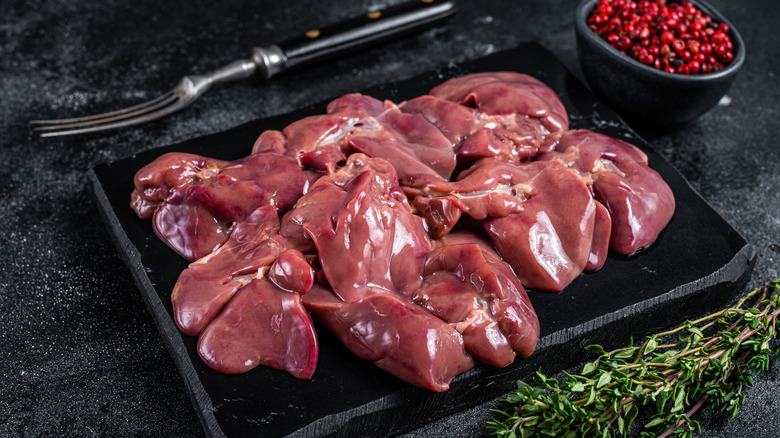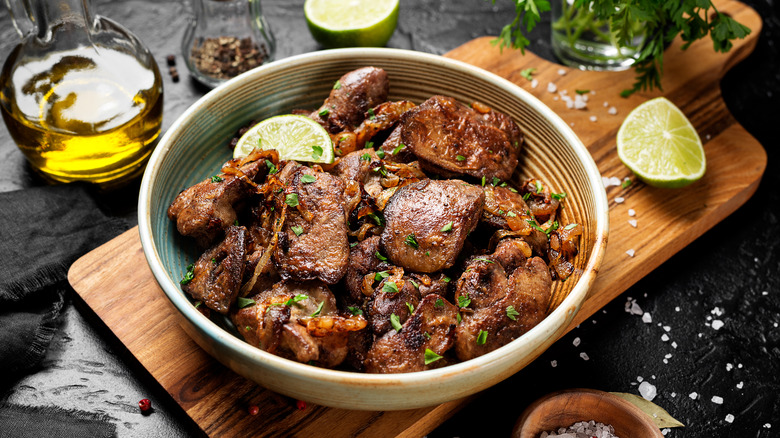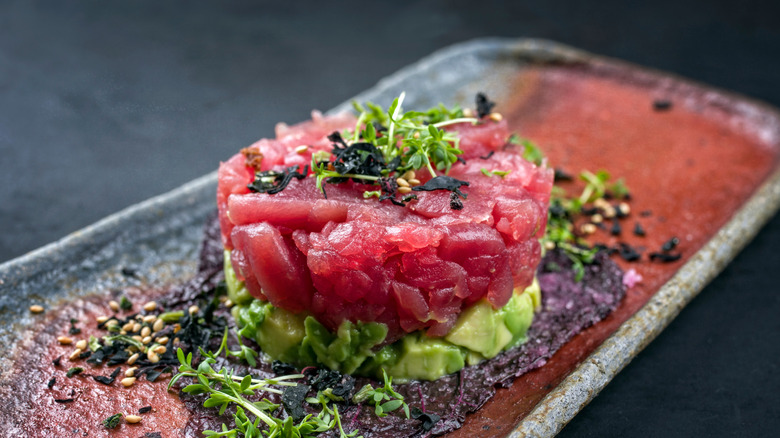Can You Safely Eat Raw Liver?
Any chef will tell you organ meats are the most popularly underutilized but potentially tastiest proteins available commercially. And in addition to the love they get from chefs for their taste, "sweetmeats" tend to be extremely high in vitamins and minerals — if you can get over the appearance and texture.
Since human beings are what we are, we're always pushing food boundaries, and organ meats are no exception. Eating raw organs, especially liver, has recently become all the rage among fitness aficionados and anyone with a deep skepticism of the modern food economy. There's even a popular jacked YouTuber called the Liver King (real name Brian Johnson) whose whole deal is eating raw organs (particularly liver, hence the name) to promote what he calls an "ancestral lifestyle." Johnson was sued earlier this year due to fraud as a result.
With the rise in popularity of raw liver and the potential health benefits (or organ meats generally), you might think maybe this is a trend you should get in on. The answer, according to reputable health experts: please don't.
No, you cannot safely eat raw liver
It's no surprise that pretty much everything you eat can potentially carry food-borne illness; there have been salmonella outbreaks linked to breakfast cereal and e.coli issues related to romaine lettuce. But proteins are particularly dangerous when it comes to this, in large part due to fruits and vegetables being easily washable, while meat isn't (seriously, please stop washing your chicken!). Typically, the answer is to thoroughly cook your meat — but what about something like liver?
It turns out that from a food safety perspective, liver is one of the worst proteins you can eat raw. It makes sense: the liver's entire biological purpose is to filter toxins, and you probably don't want to consume those toxins without mitigating the problem by cooking them out. Beef liver has a problem with e.coli, which can be found both on the outer parts of the organ and inside it, while pork liver's primary issue is parasites and hepatitis E (which aren't bacteria at all, and which are inherently inside the product). The only way to solve either problem is through cooking it, so no, you cannot safely eat raw liver. Please stop doing that.
Some proteins are fine to eat rare, but some definitely aren't
Other proteins vary in degree of safety. Stay away from raw or undercooked chicken, as salmonella and (again) campylobacter are nearly omnipresent in commercial poultry, though they're rendered inert by the cooking process (and again, please stop washing it). There's a similar principle at play with pork, where the concern is trichinosis and tapeworms.
Beef is a bit of a different situation. Steak can be safely eaten at medium rare because the potential for bacteria (primarily e.coli) largely exists on the outside of the meat — meaning it gets cooked off — so you don't need to turn your sirloin grey. But ground beef and steak tartare are more dicey, because the process of grinding can potentially evenly spread the bacteria throughout the meat. You're not automatically guaranteed to get sick from a medium cheeseburger, and it's certainly less dangerous than undercooked chicken, but it's also a bit chancier than a mid-rare New York strip.
On the other hand, raw fish is generally perfectly safe. Though some Americans balk at the idea of sushi, believing it's somehow dangerous, properly-stored fish (particularly if it's been frozen) isn't subject to bacteria. Improper storage can cause food-borne illnesses like any other food, but that's another issue entirely — to say nothing of the sustainability concerns inherent in certain types of sushi. Also, too much sushi can give you mercury poisoning. But at least you probably won't get salmonella from it!


